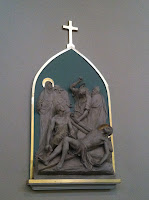Monday of Holy Week.
Holy Week is upon us. In his
Life of Christ, Venerable Servant of God Fulton J. Sheen points out an aspect of the significance of the suffering and death of Jesus which we celebrate:
"Christ entered human existence under a form which was not natural to Him as Son of God. This assuming of a human nature was a humiliation, an emptying, a stripping and a
kenosis ["self-emptying"] of His glory. The fundamental renouncement of His Divine glory created a physical condition of life which made Him appear like a man; His suffering and death were the logical consequences of this humiliation. As God He could not suffer; as man He could" (Image Books, 1990).
Although we have seen and heard the story of Christ's death and resurrection countless times in our lives, I believe it is essential to continually return to these events and try to see them with new eyes. Over the next few days I will be sharing some brief reflections on humility as it is exhibited in the various points along the Way of the Cross (along with the Agony in the Garden, for thematic and mathematical reasons).
The Agony in the Garden
The Gospel of Luke describes Jesus' fervent prayer on the Mount of Olives. He enjoins His disciples to pray that they "may not undergo the test." Earlier, Peter told Him that he was prepared to "go to prison and to die" with Jesus. Instead, Peter would deny Him three times. We are the disciples who wish to be there with Jesus, but who do not fully grasp the significance of the moment and instead grow tired and fall asleep. We are like Peter, rashly stating our intention to do good (and be praised for the intention), but when the moment of action arrives we are unprepared.
In this moment in the garden, as in all things, Jesus is our example. He prayed and sweated blood before the time of testing arrived. Unlike Peter, Jesus prayed that the cup might pass from Him, although He was willing to do the will of the Father no matter the cost. How often does our faithful prayer lead us to experience distress? If it seldom does so, is it because we are not humble enough to realize how hard the test will be?
Lord, help us to pray more fervently with the humility of Your example in the garden.
 The First Station: Jesus is Condemned to Death
The First Station: Jesus is Condemned to Death
Pilate had judicial power over Jesus because God gave it to him. The judicial system of the Roman Empire was relatively advanced and admirable in many ways (e.g., the restriction against stoning a woman caught in adultery: the Romans were on the side of Jesus on that one). However, Roman justice failed when Pilate gave Jesus over to be crucified, despite his assertion of Jesus' innocence on multiple occasions (
Luke 23:4, 14, 22).
Human justice and man-made law is only a shadow of the true source of Justice, which is God. Pilate made a show of doing the right thing, but in the end decided to do what would be easiest for himself. The humble Jesus, standing silently before His accusers, spoke more loudly of the vanity of human law than any verbal argument could have done. How often do we rest on the unfounded belief that human society can arbitrate justice infallibly? Have we trusted too much in the benevolence and wisdom of governments and other institutions instead of getting involved ourselves?
Lord, help us to see the things that human beings have created with the eyes of humility.
The Second Station: Jesus Takes Up His Cross
The cross was a horrible instrument of torture and execution. It was as much a means of inflicting psychological pain as physical pain.
Isaiah 53:8-9 prophesied that Jesus would be taken away and counted among the wicked. On the other hand, Christian mystics throughout the centuries have told us of the joy with which Christ took up His cross. As the instrument of his suffering and death, it also became the instrument of our salvation.
Christ teaches us that to love is to joyfully embrace suffering for the sake of the beloved. Joyful suffering is a theme we find running throughout the lives of the saints and all who seriously follow Jesus in their lives. Suffering is a contradiction to the World, but to Christians it is the source of ultimate joy and peace. How often have we been slow to embrace an inconvenient means of helping others? How can we say that we love someone and yet begrudge them the pain of suffering?
Lord, help us always to humbly accept the crosses that You offer for the sake of our brothers and sisters.



















